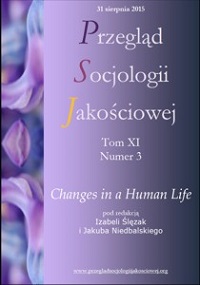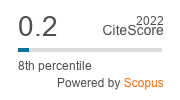The Influence of Significant Others on the Course of the Process of Leaving Sex Work
DOI:
https://doi.org/10.18778/1733-8069.11.3.08Keywords:
significant other, sex work, prostitution, symbolic interactionism, qualitative research, identityAbstract
The purpose of the article is to present the barriers to leaving sex work which are related to the influence of significant others on decisions made by sex workers. The analysis was applied in the case of two categories of significant others (organizational and intimate), which through interactions in escort agencies and on family grounds, respectively, may exert a destructive influence on sex workers’ intentions, referring to their life and the act of leaving sex work. Therefore, the relationships with significant others described in the article interfere in the process of these women’s identity transformation, hindering the development of a self-concept outside prostitution. The article is based on qualitative research carried out in escort agencies in one of the biggest Polish cities.
Downloads
References
Adler Patricia A. and Peter Adler. 1994. “Observational Techniques.” Pp. 236-246 in Handbook of Qualitative Research, edited by N.K. Denzin, Y.S. Lincoln. Thousand Oaks: Sage.
Google Scholar
Berger, Peter L. and Thomas Luckman. 1966. The Social Construction of Reality. A Treatise in the Sociology of Knowledge. Garden City, New York: Doubleday.
Google Scholar
Bindel, Julie, et al. 2012. Breaking down the barriers: A study of how women exit prostitution. London: Eaves/London South Bank University (LSBU). Retrieved June 10, 2014 http://www.catwinternational.org/Home/Article/490-breaking-down-the-barriers-a-study-of-how-women-exit-prostitution
Google Scholar
Blumer, Herbert. 1986. Symbolic Interactionism: Perspective and Method. Berkeley, Los Angeles, London: University of California Press.
Google Scholar
Denzin, Norman K. 1972. “The Significant Others of a College Population.” Pp. 185-196 in Symbolic Interaction. A Reader in Social Psychology, edited by J.G. Manis, B.N. Meltzer. Boston, London, Sydney, Toronto: Allyn and Bacon.
Google Scholar
Glaser, Barney G. and Anselm L. Strauss. 1967. The Discovery of Grounded Theory. Strategies for Qualitative Research. New York: Aldine Publishing Company.
Google Scholar
Glaser Barney G. and Anselm L. Strauss. 1972. “Awareness Context and Social Interaction.” Pp. 447-461 in Symbolic Interaction. A Reader in Social Psychology., edited by J.G. Manis, B.N. Meltzer. Boston, London, Sydney, Toronto: Allyn and Bacon.
Google Scholar
Goffman, Erving. 1963. Stigma: Notes on the Management of Spoiled Identity. New York: Simon and Schuster.
Google Scholar
Golczyńska-Grondas, Agnieszka. 2014. “Wychowało nas państwo”. Rzecz o tożsamości dorosłych wychowanków placówek opiekuńczo-wychowawczych. Cracow: Zakład Wydawniczy NOMOS.
Google Scholar
Hughes, Everett C. 1958. Men and their work. Glencoe: Free Press.
Google Scholar
Konecki, Krzysztof. 2000. Studia z metodologii badań jakościowych. Teoria ugruntowana. Warsaw: Wydawnictwo Naukowe PWN.
Google Scholar
Kuhn, Manford H. 1972. “The Reference Group Reconsidered.” Pp. 171-184 in Symbolic Interaction. A Reader in Social Psychology., edited by J.G. Manis, B.N. Meltzer. Boston, London, Sydney, Toronto: Allyn and Bacon.
Google Scholar
Månsson, Sven-Axel and Ulla-Carin Hedin. 1999. “Breaking the Matthew effect - on women leaving prostitution.” International Journal of Social Welfare 8:67-77.
Google Scholar
DOI: https://doi.org/10.1111/1468-2397.00063
Mayhew Pat and Elaine Mossman. 2007. Exiting Prostitution: Models of Best Practice. Wellington, New Zealand: Ministry of Justice. Retrieved June 10, 2014 http://www.justice.govt.nz/policy/commercial-property-and-regulatory/prostitution/prostitution-law-review-committee/publications/exiting-prositution-models/documents/report.pdf
Google Scholar
Merton, Robert. 1968. Social Theory and Social Structure. New York: The Free Press.
Google Scholar
Rapley, Tim. 2007. Doing Conversation, Discourse and Document Analysis. London: Sage Publications.
Google Scholar
DOI: https://doi.org/10.4135/9781849208901
Sanders, Teela. 2007. “Becoming an Ex-Sex Worker: Making Transitions Out of a Deviant Career.” Feminist Criminology 2:74-95.
Google Scholar
DOI: https://doi.org/10.1177/1557085106294845
Shibutani, Tamotsu. 1962. “Reference Group and Social Control.” Pp. 128-147 in Human Behavior and Social Processes. An Interactionist Approach, edited by A.M. Rose. Boston: Houghton Mifflin Company.
Google Scholar
Schütze, Fritz. 1981. “Prozesstrukturen des Lebensablaufs.” Pp. 67-156 in Biographie in handlungswissenschaftlicher Perspektive, edited by J. Matthes, M. Pfeinfenberger, M. Stosberg. Nürnberg: Verlag der Nürnberger Forschungsvereinigung.
Google Scholar
Strauss, Anselm L. 1997. Mirrors and Masks. The Search for Identity. New Brunswick, London: Transaction Publishers.
Google Scholar
Strauss, Anselm and Juliet Corbin. 1990. Basics of Qualitative Research. London: Sage Publications.
Google Scholar
Szulik, Małgorzata. 2006. “Psychologiczna sytuacja ofiary handlu ludźmi.” Pp. 369-378 in Handel ludźmi – zapobieganie i ściganie, edited by Z. Lasocik. Warsaw: Wydawnictwo Uniwersytetu Warszawskiego.
Google Scholar
Ślęzak, Izabela. 2014. “Kolektywny wymiar budowania zaangażowania w pracę seksualną kobiet świadczących usługi seksualne w agencjach towarzyskich.” Przegląd Socjologii Jakościowej 10(4):56-79. Retrieved March 21, 2015 http://www.przegladsocjologiijakosciowej.org/Volume28/PSJ_10_4_Slezak.pdf
Google Scholar
Ziółkowski, Marek. 1981. Znaczenie, interakcja, rozumienie. Warsaw: PWN.
Google Scholar
Downloads
Published
How to Cite
Issue
Section
License

This work is licensed under a Creative Commons Attribution-NonCommercial-NoDerivatives 4.0 International License.














